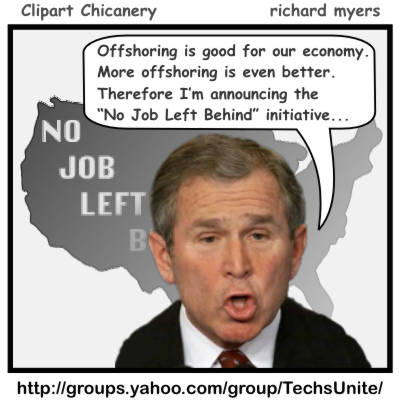Baltimore IMC : http://www.baltimoreimc.org
Commentary :: Globalization
Offshoring of jobs a hot issue
Typically high paid middle class Information Technology workers are learning what blue collar workers have known for decades-- the offshoring of working people's jobs sucks.
Typically high paid middle class Information
Technology workers are learning what blue collar workers have known for
decades-- the offshoring of working people's jobs
sucks.
TechsUnite is a union friendly discussion group for issues that concern Information Technology workers.Across the country there is a new movement afoot-- high tech workers are reassessing their commitment to "free trade". There are scores of websites representing new organizations dedicated to fighting against the scourge of offshoring. The movement is growing rapidly. Even right-wing, reactionary sites such as Free Republic are experiencing heated discussions and soul-searching about free trade vs. fair trade.Anti-offshoring graphic images from Rebel GraphicsFor those concerned about offshoring, one issue in heated contention is immigration policy. The debate concerns whether full attention should be focused upon the role of government and the corporations, or whether the nation should step up deportations and seal the borders. This is an important debate, inflamed by President Bush's proposed guest worker policy, which may take center stage during the presidential campaign.(I am firmly in the "blame the corporations and the government" camp. Get union cards into the hands of immigrants to protect living standards...)On Shore Alternatives lists those corporations that offshore, and those that don't.===============For those not familiar with offshoring, here is an article by Vermont Representative Bernie Sanders (the only independent in the U.S. Congress).===============Published on 11/4/2003 in the The Hill
Free Trade Means America’s Biggest Export is its Jobs
by Rep. Bernie SandersOur economy has been decimated by “free” trade, and someone has to point out that, like the proverbial naked emperor, our policies have no clothes — or more appropriately in this context, no jobs making clothes, or electronics, or a host of other products we use every day.Unsurprisingly, proponents of an unfettered free-trade seem unwilling to admit the error of their ways. This group, which includes virtually all of corporate America, every major editorial board, as well as Presidents George H.W. Bush, Bill Clinton, George W. Bush and Ronald Reagan, has told us for decades how many new jobs free trade would create here at home. Now the evidence is in and guess what — they were dead wrong. The exact opposite is true.Largely because of our trade policies, manufacturing is in a state of collapse. In the past three years, we have lost 2.7 million manufacturing jobs, 16 percent of the total. At 14.7 million, we are at the lowest number of factory jobs since 1958.In 2002, the United States bought $435 billion more in goods and services made in other countries than products and services made in the United States. And this year, the deficit with China alone is expected to be $120 billion, and getting worse. The National Association of Manufacturers estimates that the deficit will grow to $330 billion in five years.Our disastrous trade policy is not only costing us millions of decent jobs but has put enormous downward pressure on wages as workers compete for an ever-shrinking pool of jobs. Despite huge increases in productivity, real wages for private-sector employees have dropped 8 percent since 1973. The average American is working longer hours for lower wages and most middle-class families now require two breadwinners to pay the bills. For entry-level workers without a college education, the situation is far, far worse. Their real wages have dropped more than 20 percent in the past 25 years.The demise of well-paid manufacturing jobs is best illustrated by the following: 20 years ago, the largest private employer in the United States was General Motors, where workers earned — and still earn — a good income. Today, our largest employer is Wal-Mart, where workers earn below-poverty wages.It didn’t take a genius to predict that unfettered free trade with China would be a disaster. With Chinese employees available at 50 cents an hour, and with the ability to bring their Chinese-made products back into this country tariff-free, why wouldn’t American corporations shut down their plants in this country and move to China? Should anyone be surprised that Motorola eliminated 42,900 American jobs in 2001 and invested $3.4 billion in China? Who is shocked that General Electric threw tens of thousands of American workers out on the street while investing over $1.5 billion in China? Honeywell is a sophisticated company. Why wouldn’t we expect them to build 13 factories in China?China, for American multinational corporations, is a great place to do business, if by “do business” we mean making products for export to the United States that companies previously made here at home. Wages are extremely low in China, and if workers try to stand up for their rights and form unions, they go to jail.Environmental regulations are almost nonexistent, and, while China becomes one of the most polluted countries on earth, companies don’t have to “waste” money on environmental safeguards.Over the years, free-trade advocates have tried to gloss over the bad news about declining factory employment by promising that a new economy was in the making — one in which Americans would be working at high wages in high tech. Wrong again! Manufacturing jobs are not the only casualty of free trade.Estimates are that 560,000 high-tech jobs have been lost in this country in the last two years and that many have ended up in India. More ominous, according to Forrester Research, “over the next 15 years, 3.3 million U.S. service industry jobs and $136 billion in wages will move offshore. The Information Technology industry will lead the initial overseas exodus.”According to the Booz Allen Hamilton consulting firm, companies can lower costs by 80 percent by shifting tasks such as computer programming, accounting and procurement to China. Among many companies moving high-tech jobs abroad is Microsoft, which is spending $750 million over the next three years on research and development and outsourcing in China.So free trade has not only cost us our textile industry, our shoe industry, our steel industry, our tool and die industry, our electronic industry, our furniture industry and many others but will now cost us millions of high tech jobs as well.The United States needs to have a strong, positive relationship with China, but that does not mean allowing corporate America and its supporters in the White House and Congress to destroy the American middle class by making jobs America’s No. 1 export. If we continue to force American workers to “compete” against desperate people throughout the world, American workers will continue to lose.The United States is the most lucrative market in the world. We need to leverage its value to achieve trade agreements that result in the export of American products, not jobs.===============
Views
Information
Search
This site made manifest by dadaIMC software




